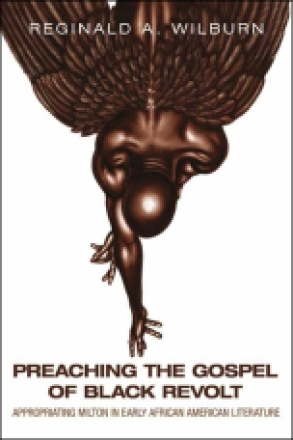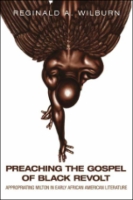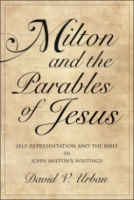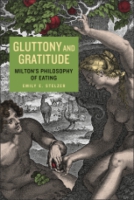
Preaching the Gospel of Black Revolt
Appropriating Milton in Early African American Literature
Reginald A. Wilburn
Preaching the Gospel of Black Revolt
Appropriating Milton in Early African American Literature
Reginald A. Wilburn
“[This] book convincingly illuminates the stylistic, thematic, and rhetorical affinities of early African-American writing with the larger English literary tradition, as well as the writers’ own agency in making this tradition their own.”
- Description
- Reviews
- Bio
- Subjects
Preaching the Gospel of Black Revolt contends that early African American authors appropriated and remastered Milton by completing and complicating England’s epic poet of liberty with the intertextual originality of repetitive difference. Wilburn focuses on a diverse array of early African American authors, such as Phillis Wheatley, Frances Ellen Watkins Harper, Frederick Douglass, and Anna Julia Cooper. He examines the presence of Milton in their works as a reflection of early African Americans’ rhetorical affiliations with the poet’s satanic epic for messianic purposes of freedom and racial uplift.
Wilburn explains that early African American authors were attracted to Milton because of his preeminent status in literary tradition, strong Christian convictions, and poetic mastery of the English language. This tripartite ministry makes Milton an especially indispensible intertext for authors whose writings and oratory were sometimes presumed beneath the dignity of criticism. Through close readings of canonical and obscure texts, Wilburn explores how various authors rebelled against such assessments of black intellect by altering Milton’s meanings, themes, and figures beyond orthodox interpretations and imbuing them with hermeneutic shades of interpretive and cultural difference. However they remastered Milton, these artists respected his oeuvre as a sacred yet secular talking book of revolt, freedom, and cultural liberation.
Preaching the Gospel of Black Revolt particularly draws upon recent satanic criticism in Milton studies, placing it in dialogue with methodologies germane to African American literary studies. By exposing the subversive workings of an intertextual Middle Passage in black literacy, Wilburn invites scholars from diverse areas of specialization to traverse within and beyond the cultural veils of racial interpretation and along the color line in literary studies.
“[This] book convincingly illuminates the stylistic, thematic, and rhetorical affinities of early African-American writing with the larger English literary tradition, as well as the writers’ own agency in making this tradition their own.”
“The first, and long overdue, major elaboration of Carolivia Herron's argument in 1987 that Milton's legacy among African American readers is both distinctive and extensive.”
“Through this book, Wilburn makes a major contribution to both Milton scholarship and African American studies by framing his argument on early African American writers’ use of Satan’s fallen journey through books 1 and 2 of Paradise Lost in order to proclaim a messianic message of racial uplift.”
“All of Wilburn’s readers owe him a deep debt of gratitude for making it possible to envision this important remapping of Milton and African American studies.”
Reginald A. Wilburn is Associate Professor of English at the University of New Hampshire, where he teaches African American literature and drama, women’s literary traditions, and intertextuality studies. He has presented his work on Milton and African American literature and culture at the Modern Language Association; the International Milton Symposium in Tokyo, Japan; the African American Studies Spring Symposium at the University of Texas, San Antonio; and the Northeast Milton Seminar. Wilburn has published in Milton Studies and is a contributing author to Milton Now.
Also of Interest
Mailing List
Subscribe to our mailing list and be notified about new titles, journals and catalogs.





